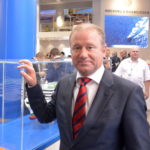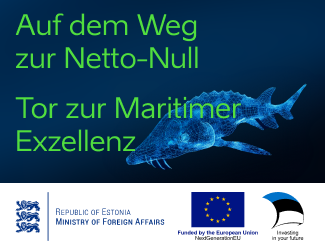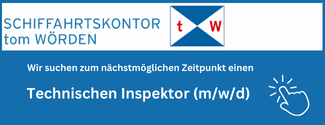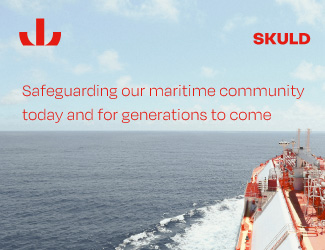In an interview with HANSA, , CEO of Flensburger Schiffbau-Gesellschaft (FSG), talks about the specific tasks of the newly built[ds_preview] »Searoad Mersey II«, why he is proud of the project, »must haves« and about the shipyard’s strengths and plans
Looking at the project, is there something you are particularly proud of?
Rüdiger Fuchs: First of all, it is the fact that we were able to win SeaRoad as a customer that is not a classic shipowner, but a freight forwarder. It was, in sum, eight years of work performed by FSG until the order was finally signed. This stamina at all parties including the shipyard in the end led to an order which is something quite special.
Why did it take so long? Did you simply not agree with each other or did the detailed work take so much time?
Fuchs: It was about the combination of the basic idea of »LNG« with this special trailer system. It took some preparation to get from the first idea to the discussions with the classification partner to the point where we could finally develop and build a product. This is also the special aspect of this vessel. The trailer system and cooperation with the customer was the real highlight since we have managed to get from the basic idea to the final project as it was envisaged by the customer in the beginning still in abstract form.
Do you think this type of technology could be transferred to other projects, too?
Fuchs: I think this idea is a good way for us as a ro-ro shipyard with highly efficient projects.
Does this mean other LNG projects could be acquired in the near future or in the medium term?
Fuchs: LNG is a very important topic for us, we do not want to file it away after just one project. It is an integral part of our product portfolio.
How important is it for your customers that FSG has a design department of its own? Is this a valuable asset in the bargain or rather something »nice-to-have«?
Fuchs: This is an absolute »must-have«. We can no longer differentiate ourselves and our location Germany by welding at high quality.
Is it your immediate concern that ships from your special segment ro-ro will be built in Asia in the future at a wider scale?
Fuchs: That’s no question of concern. The shipbuilding shops in Asia have collapsed, the shipyards over there stretch out for everything including ro-ro. But of course they do so with a different profile. I think that we still differ significantly in terms of efficiency, even when it comes to tailor-made solutions with short-term delivery times and small numbers. Of course, the Asians are also trying to succeed in the ro-ro segment, but so to say as a poor relation. If the other markets pick up again, they will put it back in the corner, but theyare a real competitor for us right now.
If your business was at stake, would you look for new target markets in the coming years?
Fuchs: In the 2000s, FSG used to be »the« ro-ro shipyard. This monoculture certainly came to an end after the shipbuilding crisis had changed the world in 2009 and later. This was not good for the ro-ro order book either. As a result, the FSG has clearly positioned itself in special vessels and has also contracted accordingly – see the projects for RollDock, WesternGeco or Siem. In 2014 we got a strategic shareholder with Siem after the previous financial investor as owner, and we are very happy about that. In the meantime, we have been able to successfully acquire ro-ro orders again, but our markets are cyclical. And we are very clearly and consistently focused on being flexible enough to be able to serve different product spectra according to the market cycles. Clearly, we want to turn to the subject of prototype business but not instead of ro-ro. Possibly there will be just one or two newbuildings per design. That is why our design department is so important to us. These designs can be ro-pax or other special vessels and it will be offshore ships when the market is recovering.
Do you expect further consolidation in the European shipbuilding industry? If so, which role could FSG play?
Fuchs: It is quite clear that the competitive pressure continues to weigh on the industry. To this extent, it is a must to continue to work on competitiveness. Then it will show who will cope with this and who will not. I see this less as a consolidation process, but more as a selective process.
What were the main challenges of the project, regardless of the LNG system and the duration?
Fuchs: In the end, it was very challenging to develop and implement the LNG concept and especially the trailer concept for the first time with all parties, customers, classes and suppliers.
In addition to the LNG part, what are the most important components on board that distinguish the ship?
Fuchs: This also includes the combination defined by the LNG system: The customer as forwarder with a core competence in trailers, plus the original characteristics of the ship as ro-ro, combined with the environmentally friendly fuel supply. In addition, the boat has what the FSG has to offer, namely a very slim and fuel-efficient shape. The lower weight allows a maximum utilization and a large load at low dead weight. All this makes our strong position in the ro-ro market.
Are there any inquiries by potential customers or conversations concerning similar projects?
Fuchs: A shipyard that is not talking to potential customers will die. We have now contracted five ships in less than a year and after a corresponding preliminary contract we are close to the conclusion of the sixth order. This is a clear message that we are back on the market.
You say »back on the market« because there have been difficulties in the past?
Fuchs: Yes, you can say that.
Interview: Michael Meyer


















